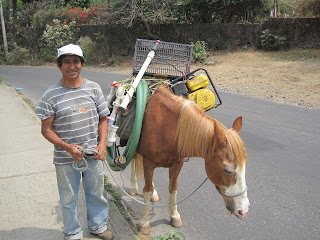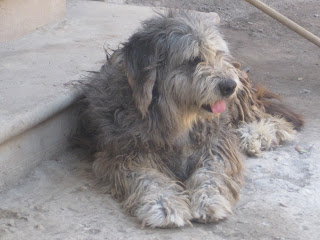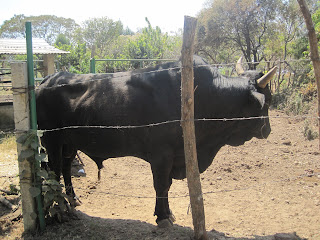The culture around dogs is entirely different here
than in most places in the USA. Dogs primarily live in the streets. It's
rare to see them on a leash. I believe the situation is similar in most
developing countries. Some of the dogs here have
owners, but the ownership of the dogs here looks very different than in the US.
The owners will feed their dogs (usually food scraps) and the dogs will come
inside their gates at night and generally sleep outside their home. There is a rampant overpopulation of dogs, though, and in too many cases, the dogs are not treated well.
Dogs here serve a very different purpose than
they do in our lives at home. Very rarely are they pet, and I've never seen
a person shnuggle up with a dog here. There are always exceptions to rules though!
I have gotten the sense that dogs sometimes serve as protection for people, and they are a presence that is often ignored. In fact, I've seen a couple of dead dogs on the side of the road. I wonder how long it takes before they're removed.
Our good friend Lisset holding her dog Toby.
I have gotten the sense that dogs sometimes serve as protection for people, and they are a presence that is often ignored. In fact, I've seen a couple of dead dogs on the side of the road. I wonder how long it takes before they're removed.
Another interesting thing that I've observed is that there is very little or no arguing shown in public here. People don't
seem to show their aggression in public places. In fact, over the 7.5 months
that we've been here, I only saw one argument out on the street.
Unfortunately, dogs seem to take the brunt of people's frustration and
aggression, though. It seems fine to kick dogs in the street and treat them
inhumanely.
The dogs that you see are often matted and have fleas. It is typical to see a dog
with a bum leg and lesions with fresh blood from an injury or a fight.
We actually watched dogs copulate. It's something that would be rare to see at home because dogs are generally neutered before they become pets. But here, dogs seen procreating is common and regarded as part of a natural process. The female dog that we saw looked like she was in pain as she yelped and tried to get away. We asked the owner of the male dog (who happened to be closeby at the time) if he could help get their dog off of her, but he just shrugged and went on with what he was doing as if it were out of his control and nothing out of the ordinary.
And the dogs are everywhere too! It's common to see dogs in stores and the marketplace. Basically, anywhere that people go, there's a good chance you'll find a dog there too!
And dogs often look hungry and in search of food.
 |
| Dogs in the marketplace. |
Pregnant
and nursing dogs are abundant too. You see many dogs with their teats
hanging.
We actually watched dogs copulate. It's something that would be rare to see at home because dogs are generally neutered before they become pets. But here, dogs seen procreating is common and regarded as part of a natural process. The female dog that we saw looked like she was in pain as she yelped and tried to get away. We asked the owner of the male dog (who happened to be closeby at the time) if he could help get their dog off of her, but he just shrugged and went on with what he was doing as if it were out of his control and nothing out of the ordinary.
 |
| This is the only photo on this post that I didn't take. These are not the dogs I saw. |
I'll also make note that poop is everywhere, dog and horse!
And the dogs are everywhere too! It's common to see dogs in stores and the marketplace. Basically, anywhere that people go, there's a good chance you'll find a dog there too!
 |
| Here's a dog looking for food in the large marketplace where there are also restaurants. |
 |
| My spanish teacher Silvia loves her dogs and cats and takes great care of them. They're lucky to have her! |
But the poorer Mexicans consider dogs a nuisance, an extra mouth to feed and often a dangerous animal to be avoided. And of course, because these dogs are starving and often sick, they can be dangerous and often should be avoided. My experience has been that the dogs we see primarily keep to themselves. I generally don't feel threatened, but Brian often carries rocks when we're walking just in case!
The disconnect here is that Mexicans
in general do not approve of sterilizing their dogs, as shown in earlier photos. It’s a Catholic thing, and/or they can’t afford it. There is a common belief in
Mexico that sterilizing a male dog will make the dog "gay." In
addition, vets seem to charge a lot of money
to sterilize and are just now realizing that maybe it’s in everyone’s best
interest if they lower the price.
Here's a link to a trailer to the
documentary film, "Compassion to None." It is about the
overpopulation of dogs in
Mexico.
http://www.companionstonone.com/trailer.html
http://www.companionstonone.com/trailer.html
It's well worth your time to watch if you're interested in this issue!
While animal activists in the U.S. argue over how
best to deal with America's pet overpopulation problem, their counterparts in
Mexico are fighting far more rampant pet overpopulation. What's worse is
that homeless dogs are often electrocuted, rather than euthanized by injection
as is the norm in American shelters.
We have had a cat here in Tepoztlán. I had the
experience of taking him to a free, mass sterilization clinic here in our village. As I've alluded to in the past, things are much more out in the open here. Things that are
uncomfortable aren't hidden in the same way that they are at home. So, under a huge tent, there were hundreds of
animals anesthetized and operated on. There were five
doctors working hard as the owners of the pets watched. The animals
were strapped on tables and cut open.
I chose not to watch my own cat, but I did watch a very pregnant dog be sterilized. The sacks that her pups were in were removed and thrown in a pail.
I chose not to watch my own cat, but I did watch a very pregnant dog be sterilized. The sacks that her pups were in were removed and thrown in a pail.
After the dogs and cats had their
operations they all laid on a carpet under the tent, about fifty at a time,
totally unconscious.
I learned that the doctors were paid from donation money. Make note that there are some very wealthy people who live in our village, but they're definitely a small minority. My hope is that more sterilization of cats and dogs occurs over time and that the abuse of these animals comes to an end.
Here are photos I've taken here of dogs in the street.
 |
| Yum, something good to eat! |
 |
| There's nothing like a good yawn! |
And dogs somewhere other than the street.
The two dogs below belong to our close friends Jose, Aurora, Jose Junior, and Lisett. They are in their home, and Toby just scored some meat!
 |
With the neglect of the dogs that exists, I've also noticed how sweet they can be, and playful too!
And Lea had a great time with this guy!
 |
| I know it looks like the pooch is kissing her here, but I think what looks like the dog's tongue is actually something in the background. I hope! |
And here are photos of horses which are also common to see in the streets.
 |
| Look what this horse is carrying! We continue to be amazed at how resourceful people here can be. |
Here's a short video of a bunch of men riding horseback that passed us on the street.
And a donkey!
And cows!
And a bull!
Below is a photo and short video of a Jaripeo (or kind of rodeo) that we saw in a town outside of Tepoztlán that we visited. There were about 20 horses in a ring. Men rode them while carrying and throwing lassoes at the one bull that was in the ring with them. The objective was to capture the bull until it's caught and eventually falls to the ground. Then a man got on the angry bull and rode it after it was released. They did this with numerous bulls. It was really hard for me to watch. The cruelty of the bulls was so visible.
Here's a short video of the "Jaripeo" that we saw.
If you're interested in seeing men riding bulls watch this short video.
And another really interesting animal that are seen close to the pyramid that I hike up to. They're not shy at all to go for your food!
And although these aren't animals, per say, I thought I'd include them here.
And a couple of creepy crawly's found in our home!
 |
| Yes, a HUGE spider! |
 |
| And a scorpion, which are commonly seen. Eek! |
 |
| I think this is one of my best photos ever! |
And here is one cat in particular, our cat Leo, who we've grown to love dearly. He's become part of our family, and we'll miss him lots when we leave. And he's never been out on the street as far as I know!





























































































What fun and also what realism. You are showing us many aspects of dog life in Mexico with these photos. Pretty uncensored in the open air vet images. I like the one of 50 dogs still asleep.
ReplyDeleteThanks for putting this together, even better than your VW bettle blog.
Thanks so much for your comment. I still don't know who you are, mystery man!
ReplyDeleteKeep fur dry to avoid rashes. website
ReplyDelete